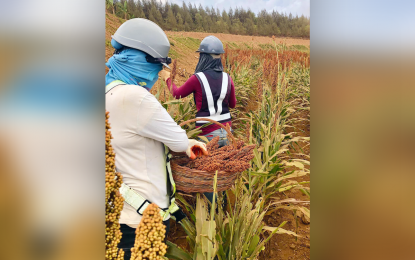
SORGHUM HARVEST. Environmental workers of the Cagdianao Mining Corporation in Barangay Valencia, Cagdianao, Dinagat Islands province, conduct harvesting of sorghum on a rehabilitated mined out area early in September this year. The harvest came after a three-month trial with the aim of promoting the crop's cultivation among local farmers to ensure food security in the area. (Photo courtesy of the NAC-CMC Mine Environmental Protection and Enhancement Office)
CAGDIANAO, Dinagat Islands – To ensure food security amid the global coronavirus pandemic, sorghum has been introduced to a coastal village here as an alternative to rice.
Jessie D. Dumanig, an agriculturist at the Cagdianao Mining Corporation (CMC), said Monday the company decided to choose sorghum for cultivation among local farmers following the success of a three-month trial run at a rehabilitated mined-out area.
Dumanig said the 20 kilos of sorghum harvested earlier this month proved that sorghum can be propagated on a lateritic area, where local farmers have difficulty growing rice and other crops because the soil naturally lacks enough nutrients.
In addition, he said sorghum -- currently being promoted by the Mindanao Development Authority because it is cheaper to produce and yields higher profit than other crops, such as corn -- is easier to grow and healthier because it contains less sugar.
According to Dumanig, the idea of sorghum cultivation came from CMC environmental manager Phoebe Jean Alac, who started searching for fast-growing crops that are not only fit for the area's soil constraints but are readily available locally.
He noted the company had difficulty obtaining seedlings for the company's demonstration farms when the Covid-19 pandemic was declared in March.
Alac, a marine biologist and environmental planner, said sorghum was a natural choice because it can be planted all year round with less water requirement.
“The uncertainty the pandemic has brought to the communities compelled farmers to re-assess their farming techniques to ensure food security for their family, so the circulation of the seedlings became a bit controlled and were kept in smaller groups. We had to look for alternatives, and sorghum is perfect,” Alac explained.
“We want alternatives to rice and sorghum saved the day. Sorghum is rich in fiber, protein, and calcium," she added.

Engr. Arnilo C. Milaor, CMC resident mine manager, said the company is gearing to promote sorghum and other cash crops for adoption among local farmers after seeing its potentials.
“Especially because of the pandemic, CMC has stepped up its efforts to protect food security by encouraging the people in the mining communities to consider high-value crops. Sorghum is good because it can withstand heat and the dry season plus it is in demand even in international markets so we are promoting this in the communities” Milaor said.
“Sorghum does not need special irrigation, the rain is enough; our only problem is the birds who love to feast on them," Milaor pointed out.
Meanwhile, Dumanig said that as part of the company's five-year agroforestry initiative, local farmers will be trained on "calendar farming."
“Basically, it means farmers would shift from being supply-oriented to demand-driven, planting and harvest will be paced accordingly to ensure the continuous supply of agricultural produce. Plus, there will be income from other crops because the soil is healthy enough to yield the entire year," Dumanig said.
CMC, an affiliate of Nickel Asia Corporation, is mining export-grade nickel ore in Barangay Valencia here. (Press Release)
